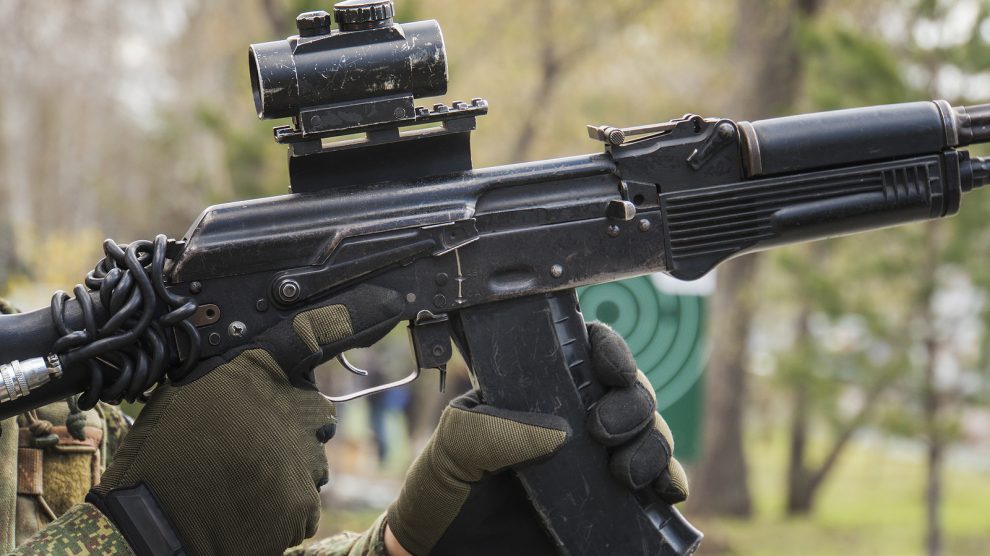What happens to weapons when war ends? Often, they end up in the hands of criminals and terrorists. A HALO Trust project in Bosnia and Herzegovina is making the country’s extensive arsenal safe, and setting an example to other countries in the Western Balkans.
A project to develop a new weapons marking and registration system for the armed forces of Bosnia and Herzegovina has not only made safe 95 per cent of the country’s arsenal, it has set a path for similar programmes across the Western Balkans.
Since 2017, HALO Trust, a non-political and non-religious registered British charity and American non-profit organisation which removes debris left behind by war, in particular land mines, has worked with the armed forces of Bosnia and Herzegovina (AFBiH) and the European Force in Bosnia (EUFOR) to oversee an innovative weapons management system that has registered 63,000 weapons – thereby preventing them being diverted for criminal and violent use.
- Enough of double standards in Bosnia and Herzegovina
- Just how much influence does Russia have in Bosnia and Herzegovina?
- Bosnia and Herzegovina’s entirely predictable refugee crisis
The Balkan Wars of the 1990s left large quantities of weapons in poorly managed stockpiles and in the hands of military and police as well as militias and civilians. Subsequently, the Balkans has become an acknowledged source of guns diverted from official stockpiles for illicit use in Europe and elsewhere.
Real-life implications
“The weapons used for the Charlie Hebdo and Bataclan attacks in Paris were originally manufactured in Bosnia. The weapon used in November’s Vienna attack was an AK-47 made in former Yugoslavia. So, there are real-life implications of what we are attempting to stop,” says Steph Barnwell, HALO’s Bosnia programme manager.
Following a national assessment with the organisation Small Arms Survey in 2017, HALO, AFBiH and EUFOR have marked and registered almost the entire state military stockpile in Bosnia and Herzegovina.
HALO also worked with the UK-based company Pryor Marking Technology. The backbone of this unique project is a comprehensive database and secure record-keeping system, produced by researching and cataloging the Bosnian military inventory before marking began.
HALO’s hope is the extensive consultative and legal-political preparation it put in place for this marking project to begin can be replicated in other Western Balkans countries.
Results
An assessment of the project was carried out by the Bonn International Centre for Conversion and concluded: “Measured against its purpose—and in terms of efficiency—HALO’s marking and registration project in BiH has been a success. The preparation phase, specifically the logistical coordination and design of the database, proved to be more demanding than the marking procedure itself. The transfer of HALO’s experiences elsewhere therefore need to consider the substantial preparatory legal and political input as well as the logistical and training requirements.”
HALO’s work in Bosnia and Herzegovina is funded by the German Federal Foreign Office, the United Kingdom and the Norwegian Ministries of Defence, and the United Nations Trust Facility Supporting Cooperation on Arms Regulation (UNSCAR).
“Donors are looking for results in the Western Balkans and this well-coordinated partnership between the private, military, and humanitarian sectors in Bosnia and Herzegovina provides a model to support and emulate,” says Mike Newton, deputy head of region for Europe, HALO Trust.
Unlike many news and information platforms, Emerging Europe is free to read, and always will be. There is no paywall here. We are independent, not affiliated with nor representing any political party or business organisation. We want the very best for emerging Europe, nothing more, nothing less. Your support will help us continue to spread the word about this amazing region.
You can contribute here. Thank you.







[…] Link to original article […]
[…] Bringing technology and transparency to weapons stores in the Western Balkans […]